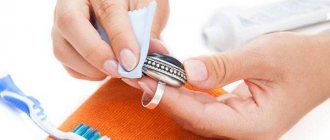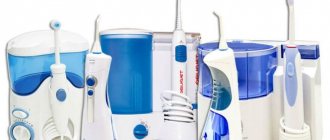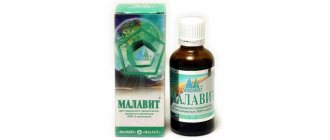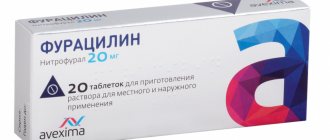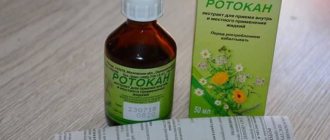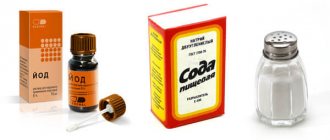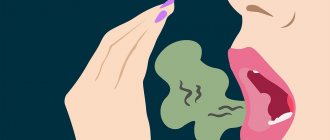Oral hygiene is of great importance for health. From childhood, everyone is taught the importance of brushing their teeth at least twice a day.
However, there is an opinion among experts that brushing your teeth is not enough. In addition to toothpaste, you need to use dental floss and mouthwash.
In light of recent research, oral fluid improves hygiene, freshens breath, and kills bacteria living in the mouth.
Liquids on the market differ not only in smell and color, but also in properties. Unfortunately, many of them contain not entirely healthy ingredients that can be harmful to health and the environment.
It's easy to make your own mouthwash with just a few ingredients. In terms of action and benefits, homemade rinses are not inferior to store-bought ones. And sometimes they even surpass.
Let's figure out where in everyday life you can use Listerine mouthwash.
On the shelves of stores and pharmacies there are many bright bottles with the inscription: “Mouthwash.” Everyone knows that this product works for its intended purpose - it refreshes the oral cavity, destroys bacteria, and makes breath fragrant. But few people realize that mouthwash can be used for many more simply incredible cases.
The most common breath freshener in the world is Listerine, created back in the late 19th century. Now it is produced by Johnson & Johnson, a world leader in the production of hygiene products and household chemicals. Listerine contains ingredients that have a powerful bactericidal effect: essential oils of eucalyptus, menthol, salicylic acid, thymol. The drug copes with herpes and influenza viruses, treats stomatitis.
Before Listerine started killing germs in the mouth, it killed bacteria on hospital floors and bathrooms. That's right, because in the late 1800s, Listerine was originally developed as a hospital-grade antiseptic for cleaning areas and instruments. And only then they began to use it as a “special pharmaceutical product for dentists.” It was typically marketed to consumers as an all-purpose cleaner used to disinfect floors and also treat feet and underarms.
The product was used as a disinfectant until the 1920s. Lambert Pharmacal then invented the bad breath "disease" known as halitosis and began marketing Listerine as a cure. For the creator of the product, Jordan Lambert, this was a profitable step - in just seven years, his company's revenue grew from 115 thousand to more than 8 million dollars.
Since then, people all over the world have been sweeping this single-use home cleaner off drugstore shelves and sprinkling it into their mouths in hopes that it will freshen their breath. Listerine can also be bought in Russian pharmacies, where its cost is very low.
Of course, you can continue to rinse your mouth with this “floor cleaner.” However, we decided to familiarize you with 16 more options for using mouth freshener with its terrible taste that we found on the Internet. This simple and accessible remedy may open up to you from a completely unexpected side. So, a mouth freshener can be used:
Ecological trail
There are two main benefits to making homemade cosmetics. One feature is maintaining health, since you only use cosmetics that do not contain chemicals. Remember that the body absorbs everything through the skin or “evaporation” from cosmetics.
The second reason homemade beauty products are effective is that you reduce the amount of waste generated and live a more eco-friendly lifestyle. You do not buy a new plastic bottle, which subsequently decomposes for a long time, but from natural substances you create your own cosmetic product, which is again placed in the same glass container. This way you won't create unnecessary waste or burden the planet with more plastic.
If you make homemade cosmetics from substances such as essential oils, etc., which come from organic farming, you can be sure that you are going the right way and thinking about our planet.
To disinfect the toilet
Seika Chujo/Shutterstock
This powerful bacteria killer can be used to both clean and disinfect your toilet. All you need is to buy Listerine mouthwash from the pharmacy and take a toilet brush. Pour a capful of liquid into the toilet and leave for 15 minutes. Use a toilet brush to remove dirt from the toilet rim, then flush. You will end up with a clean toilet. (For best results, use a mint scented product.)
Natural homemade recipes for brushing teeth
Natural toothpaste and homemade teeth cleaning recipes are very easy to make, and it's worth taking the time, even if it's just a few weeks, to give your body a break from fluoride. Although fluoride is very good for our teeth, strengthening them and helping to protect them from decay, it also has adverse effects on the nervous system. With increasing levels of fluoride being added to our drinking water and toothpastes, it is no surprise that more and more people are now choosing to make their own dental cleaners. Below are two tooth cleaning options that I often use to brush my teeth at home, and they are just as effective as the toothpaste I buy at the store.
For washing clothes
Victoria Shapiro/Shutterstock
You can kill almost all bacteria on your clothes by adding mouthwash to the water the next time you wash them. Turn on the washing machine and let it fill with water. Before starting the cycle, pour one cup of mouthwash into the detergent container and continue washing as usual. Mouthwash will kill any germs lurking on your clothes.
Caution: Do not use mouthwash with natural or artificial dyes, which may stain your clothes.
What causes a lack of saliva?
The list of factors that can cause dry mouth is very wide. Possible reasons include:
- pathological processes in the gland itself: inflammation, tumors, stones in the ducts;
- systemic connective tissue diseases: Sjogren's syndrome, lupus erythematosus, rheumatoid polyarthritis;
- diseases of the endocrine system: thyrotoxicosis, diabetes mellitus, hypogonadism, as well as hormonal changes during pregnancy;
- damage to the nervous system: contusion of the base of the brain, tabes of the spinal cord, peripheral damage to the facial nerve;
- diseases of individual organs and systems: renal failure, gastroenterocolitis;
- acute infectious diseases: botulism, typhoid fever;
- viral hepatitis C;
- undergoing a course of radiation therapy or chemotherapy;
- conditions that lead to inhibition of secretion: fear, anxiety, pain, neurosis;
- side effects of certain drugs: antitumor drugs, diuretics, tranquilizers;
- lack of vitamins A, C, B, as well as iron;
- smoking, alcohol and coffee abuse [1, 2].
The doctor should first find out the cause. The exact diagnosis determines how to stimulate salivation and whether it is necessary to prescribe synthetic saliva substitutes.
For cleaning the washing machine
Shutterstock
You can use Listerine type rinse liquid to disinfect the washing machine itself.
Allow the washing machine to fill with water, add one cup of rinse aid, and run a full cycle. Your washing machine will eventually be completely free of germs. see also
16 Ways to Use Candles You Probably Didn't Know About
What are the benefits of home remedies?
The right combination of natural remedies, healing herbs and essential oils will help get rid of many dental problems: relieve swelling and inflammation, reduce the likelihood of caries, get rid of germs and infections, and even lighten your teeth a little.
In addition, the “author” of a unique hand-made mouthwash will know exactly the composition, and there will be no chemicals in it. Not all components of purchased mouthwashes are useful. Triclosan, for example, affects not only harmful bacteria, but also beneficial ones, and alcohol-containing preparations dry out the oral mucosa.
To combat dandruff
Doucefleur/Shutterstock
Listerine antiseptic contains active components of essential oils. This makes it ideal for killing fungi, particularly Malassezia yeast, which causes dandruff. To combat this scourge, mix half a glass of mouthwash and half a glass of water and pour into a spray bottle. Apply the solution to clean scalp and leave for five minutes, then rinse. The condition of your scalp will improve, the amount of dandruff will decrease, and your hair will smell like eucalyptus or menthol.
Scented toilet cistern disinfectant
An alternative option is to prepare aromatic additives that are placed in the tank. The cooking instructions are extremely simple.
- Take two bowls.
- In one of the bowls, steam 15 g of gelatin.
- In the second, mix 1 table. a spoonful of salt, a few drops of fragrant ether and half a glass of vinegar. Color the mixture with any dye you like.
- Mix both mixtures.
- Take ice molds, put the substance there and leave it in the freezer.
- After a couple of hours, take out the cubes and systematically place a couple at a time in the toilet tank.
- Every time the water is flushed, the automatic tank aroma disinfects the liquid and destroys bacteria.
To combat foot fungus
william casey/Shutterstock
A mouth disinfectant successfully “treats” not only the head, but also the legs. If you suffer from foot fungus, mix equal parts warm water, white vinegar and Listerine in a basin or bathtub. Make sure there is enough water to completely submerge your feet. Sit in this solution for 45-60 minutes to be sure to kill any bacteria. After this procedure, your feet will become soft and exude a fresh aroma.
Remedies for gum inflammation
Therapeutic rinses , which have an anti-inflammatory effect, help relieve inflammation, stop bleeding, strengthen the gums and prevent the development of periodontitis .
You should know! The most effective antiseptic solutions in the treatment of gum disease are:
- Asepta Active.
- Parodontax Extra.
- Colgate Total Pro Gum Health.
- Splat Complete.
- Forest balm with sage extract.
- Listerine Expert Gum protection.
As a foot scrub
onegoodthingbyjillee.com
You can also make a foot scrub using a rinse to exfoliate dead skin. Mix one third cup Listerine, one third cup white vinegar and two cups white sugar. You can also add one tablespoon of coconut oil to soften and moisturize the skin and a few drops of essential oil for aroma (try to choose one that goes well with the smells of vinegar and Listerine). You can use this formula daily to keep your feet soft and looking perfect all the time.
How to make a mouthwash
To make a simple mouthwash you will need a few basic ingredients.
Namely:
- sea salt, which has a bactericidal effect and is rich in minerals;
- alcohol or water tincture of herbs;
- soda, which effectively cleanses bacterial plaque;
- essential oils that have good antibacterial and anti-inflammatory effects.
“Store-bought” mouthwashes contain substances such as thymol and methyl salicylate.
These are antiseptics with a toxic effect, which are contraindicated during pregnancy and are not intended for oral administration.
If accidentally swallowed, adverse reactions may occur, especially when there are diseases of the gastrointestinal tract. Rinsing your own has many benefits. You can select each ingredient yourself, which is especially important for allergy sufferers. This rinse is natural, it does not contain preservatives or dyes, which means side effects are minimized. It is also a very economical option, which is good for large families.
A DIY rinse can be a bleaching agent if you add a little apple cider vinegar or lemon juice to it. To prepare, you need to take a glass of water, a spoonful of hydrogen peroxide, 3 drops of eucalyptus oil, a teaspoon of calendula tincture. Hydrogen peroxide is first added to a glass of water, then the remaining components. The mixture is thoroughly mixed, after which you can rinse your mouth.
For an antibacterial rinse, you will need an infusion of chamomile or thyme; a decoction of oak bark is also good.
Recipe for making an antibacterial mouthwash:
- You will need two tablespoons of chamomile, a teaspoon each of salt and soda, 4 drops of tea tree oil.
- Chamomile is poured with boiling water, then filtered.
- Salt, soda and ether are added to the broth.
A good natural antiseptic is aloe, from the juice of which you can make a mouthwash. To do this, you need to mix 100 ml of mineral water, 20 drops of mint oil, a spoonful of citrus juice, a spoonful of oak bark infusion and 100 ml of aloe juice.
As a facial toner
AliceCam/Shutterstock
Mouthwash contains an antiseptic, so it can be an effective astringent for the face. Pour a small amount of sugar-free mouth freshener onto a cotton pad or facial tissue and apply it directly to your skin. You can either spot treat each pimple or spot, or, if necessary, wipe the entire face with the product.
see also
20 Ways to Use Hand Sanitizer You May Not Know About
To remove odor from the trash can
Elly/Shutterstock
Don't let your trash can create an unpleasant odor in your home while it sits waiting for the trash to be taken out and thrown away. To prevent bad odor, you can use a small amount of mouthwash. Apply a small amount to a cotton pad or paper towel and throw in with the rest of the trash. As a result, there will be no unpleasant odor in the place where the garbage is located.
Antibacterial agents
Antibacterial rinses suppress the growth and activity of pathogenic microorganisms that contribute to the development of caries.
They reduce the formation of soft and mineralized plaque and reduce gum bleeding.
Among the many options, dentists highlight:
- PresiDENT Professional.
- Listerine Total Care.
- Lacalut Sensitive.
- Colgate Plax Comprehensive protection.
Remember! You can use antibacterial rinses based on chlorhexidine or containing triclosan for two weeks, after which you should temporarily stop using them.
To clean the kitchen sink drain
Ari N/Shutterstock
Kitchen sinks, especially those equipped with a food waste disposer, can become a source of quite unpleasant odors if they are not cleaned regularly. This happens because food particles that end up in the drain can begin to decompose and smell accordingly. If you need to unclog your drain but don't feel like boiling water or reaching for vinegar and baking soda, you can simply pour a capful of mouthwash down the drain. This is a great product to kill bacteria and freshen drain odors.
Toilet scent based on aromatic oils
People most often use toilet fresheners. An unpleasant odor appears there, which can only be destroyed with a strong stream of aroma. To create a scented mixture, you will need an essential oil.
- A simple option with cotton wool. Drop some oils onto the cotton wool, put it in a small jar and leave it for a while on the radiator or in the sun in the summer. The resulting heat will cause the oil to heat up and give off an odor. After this, transfer the container with the cotton wool to the toilet. To prevent the aroma from depleting, periodically add fragrant oily liquid. Perfectly copes with the unpleasant smell of cedar, orange or pine oil.
- Automatic spray. To create it, take: a spray container, water and essential oil. A glass cleaning liquid container is perfect for this recipe. Pour ¾ of water into it and add 25 drops of oil. Shake well. If you make a home air freshener using this recipe, it will absorb the unpleasant odor and wonderfully freshen the room. Spray the room systematically and enjoy the fragrant freshness.
Keep flowers fresh
Emily March Photography/Shutterstock
According to the gardening website Plantea, Listerine contains sucrose and a bactericide, ingredients that serve as food for plants and protect them from bacteria. Experts also note that Listerine's acidity "helps water move up the cut stem."
The next time you are presented with a bouquet of fresh flowers, make your own plant food at the rate of one teaspoon of mouthwash per liter of water and pour the mixture into a vase. As a result, your room will smell fragrant with long-lived flowers. Just do not use a rinse that contains ethyl alcohol, which is harmful to plants.
Which irrigator liquid is better?
In fact, the choice depends on the medical indications and the effect that needs to be achieved with the help of rinses. Each solution has certain properties, according to which it is necessary to select the liquid. The following balms are in demand in our online store:
- Irix with fluoride;
- Irix with menthol;
- Donfeel “For sensitive teeth and gums”;
- Donfeel “Comprehensive protection. Daily care";
- Donfeel "Prevention of gum disease";
- Donfeel “Care for tooth enamel”;
- ROCS PRO;
- "Albadent";
- "ASEPTA" Parodontal.
They are absolutely safe and effective, which is why they are approved by doctors.
Irix with fluoride
"Irix" is produced in Russia and is intended both for filling irrigators and for rinsing the mouth. The liquid is produced in concentrated form. The concentrate must be diluted in water if used with the device. The proportions are indicated in the instructions. To rinse your mouth after eating, you do not need to dilute the liquid. The product is indicated for people with bleeding gums. The fluoride contained in the balm reduces their sensitivity and tendency to bleed.
pros
- does not contain preservatives;
- no alcohol in the composition;
- has an antiseptic effect;
- protects teeth from caries and plaque;
- does not form foam;
- It is used sparingly.
Minuses
- Does not treat diseases - more effective as a preventive measure.
Irix with menthol
Another mouthwash with menthol from the Russian brand Iriks. The main purpose of the balm is to cleanse the oral cavity of food debris and freshen breath. The liquid does not contain alcohol, so it can be used by adults and children.
pros
- no preservatives in the composition;
- washes away germs from teeth and gums;
- freshens breath well;
- is used sparingly;
- does not form foam.
Minuses
- Suitable primarily for prevention.
Donfeel "For sensitive teeth and gums"
Premium balm for daily use with or without irrigator. The liquid is based on extracts of chamomile, sage and lemon balm. The amount of fluorine in the composition is minimal - 0.02%. Indicated for sensitive gums and teeth. This product promotes tissue regeneration, strengthens the enamel and forms a protective film on it, which prevents the formation of plaque. The balm has a pleasant berry aroma.
pros
- freshens breath;
- has an antibacterial effect;
- does not contain preservatives;
- creates protection against caries and plaque.
Minuses
- The liquid has no disadvantages. It is suitable for daily use by children and adults. Allergic reactions to individual components of the solution are possible, but in itself it is safe.
Donfeel “Comprehensive protection. Daily care"
Herbal balm is intended for daily treatment of the oral cavity. It can be poured into an irrigator or used as a rinse. The product has a complex effect: cleanses teeth and gums, washes away germs, prevents plaque from settling, and freshens breath.
pros
- suitable for almost everyone;
- has no contraindications;
- has a wide range of actions.
Minuses
- Less effective than special products for sensitive teeth, balms for gum disease, etc.
Donfeel "Prevention of gum disease"
One of the common dental problems is gingivitis - inflammation of the gums without compromising the integrity of the tooth and its root. Symptoms of the disease are increased sensitivity of the gums, pain when chewing, bleeding. The pathology is treated at the dentist, but as a preventive measure you can use Donfeel “Prevention of Gum Diseases” balm. Its regular use with an irrigator helps strengthen the gums, protecting them from inflammation.
pros
- relieves the inflammatory process;
- protects gums from diseases;
- freshens breath;
- contains only herbal extracts.
Minuses
- Individual allergic reactions to individual components of the solution are possible.
Donfeel “Tooth enamel care”
The balm strengthens tooth enamel and prevents plaque and tartar from forming. After rinsing your mouth with this product, a thin protective film is formed on the gums and teeth, which protects the tissues from external influences. The mouthwash is ideal for smokers.
Advantages
- has an antibacterial effect;
- has a refreshing effect;
- does not contain preservatives;
- Suitable for adults and children.
Minuses
- There may be an allergy to certain components.
ROCS PRO
A remineralizing agent that strengthens enamel and protects it from destruction. The balm is produced by a domestic manufacturer, and therefore is inexpensive. But at the same time, it is very effective: the components of the solution saturate the teeth with minerals, strengthening and restoring the enamel.
pros
- prevents the development of caries;
- reduces the risk of tissue inflammation;
- strengthens enamel and gums;
- freshens breath;
- It's inexpensive.
Minuses
- The whitening effect occurs only after several weeks of using the balm.
"Albadent"
This liquid for irrigator is produced by Russian. The balm can also be used as a rinse without a device. The solution effectively removes plaque from coffee and cigarettes from teeth, freshens breath and has an anti-inflammatory effect.
pros
- strengthens gums and enamel;
- cleans hard-to-reach places;
- suitable for implant care;
- has a deodorizing effect.
Minuses
- Causes a slight tingling sensation on the tongue, which is explained by the presence of mint in the composition.
"ASEPTA" Parodontal
The product is suitable for filling an irrigator and rinsing the mouth after eating. This liquid cleans teeth and interdental spaces well from food and germs, freshens breath, and helps reduce enamel sensitivity. The balm is recommended for people whose gums often bleed.
pros
- no alcohol or preservatives in the composition;
- effectively removes food debris and bacteria;
- based only on natural ingredients;
- prevents the development of caries;
- has an antiseptic effect.
Minuses
- It does not have the effect of removing plaque from teeth from coffee and tobacco smoke.
Get rid of sweat odor
siam.pukkato / Shutterstock
The antifungal and antibacterial elements of mouthwash work great outside of the mouth, too. They readily deal with bacteria that cause unpleasant body odor, so the rinse can be used as a deodorant. Soak a cotton pad or Listerine wipe and wipe underarms if necessary. Destroying bacteria will prevent the unpleasant smell of sweat from appearing.
Features for adults and children
For young children, manufacturers have developed rinses without alcohol or aggressive components that can dry out the mucous membrane or cause an allergic reaction.
Due to an unpleasant or intense taste, children may refuse to use the product.
Therefore, hygiene solutions for babies have a light aroma and pleasant taste.
The choice of rinses for adults should be treated no less responsibly, because the wrong solution will not bring any benefit and will aggravate the situation .
To remove a bruise
Vladeep/Shutterstock
If you accidentally bump somewhere and feel that you will get a bruise, then mouthwash will help prevent it. Soak a cloth with an alcohol-based mouthwash and apply it to the affected area. Listerine will prevent you from getting a big bruise after bumping into your nightstand or bed in the middle of the night (or otherwise getting it).
Terms of use
How to use mouthwash correctly:
- It is better to prepare solutions daily to get maximum benefit from them.
- Rinse is carried out after brushing your teeth.
- The oral cavity should be rinsed for about 2 minutes, collecting 15-20 ml of solution.
- The product should be stored in a dark place out of reach of children.
- For half an hour after rinsing, you do not need to eat anything to allow the medicinal components to act on the mucous membranes and teeth for some time.
- Under no circumstances should spoiled products be used.
For those who are experiencing toothache or inflammatory gum disease, natural rinses with iodine and salt are suitable. Soda is a natural antiseptic, and it also removes bacterial plaque well when there is an ulcer or aphthae. When there are periodontal pathologies, it is more effective to use alcohol tinctures, which can be used to rinse your mouth daily throughout the entire treatment period.
Alcohol rinses are recommended for aphthous stomatitis and various forms of gingivitis. They are contraindicated during pregnancy and for young children.
As for mouthwashes for children, they can be used from the age when the child understands that the liquid must be spit out. Before this period, the mucous membrane should be wiped with a cloth soaked in the solution.
As a window cleaner
Voyagerix/Shutterstock
Want to clean your windows but don't have any detergent on hand? Mouthwash can be a great alternative to traditional glass cleaners. Mix equal parts water and mouthwash in a spray bottle or wet a cloth and wipe down windows, glass countertops, mirrors and other interior features. The result should exceed all expectations - the glass will be crystal clear and streak-free.
As a bathroom cleaner
Stokkete/Shutterstock
Remember what Listerine mouthwash was originally? You can take mouthwash back to its origins and use it to clean your bathroom floors and tiles. Use a liquid antiseptic directly on the surface or dilute it with water in equal proportions to clear soap scum and remove mold and mildew from bathroom tiles.
What should be the liquid for an irrigator?
Balms and rinses that can be used in conjunction with irrigators are produced today in large quantities. High-quality products that are safe for health must meet a number of requirements:
- filtered;
- no sediment;
- sterility;
- Doesn't create a lot of foam.
When purchasing a liquid, you should pay attention to its composition, beneficial properties and purpose. If you are prone to allergies to such products, choose hypoallergenic solutions. They are sold without a prescription, but before purchasing it is advisable to visit a dentist so that he can rule out contraindications. Now we’ll find out which liquid is better and why.
To fight fleas
Arman Novic / Shutterstock
An alcohol-based mouthwash such as Listerine can penetrate fleas' shells, killing them in minutes. If these insects are infested in the house, then to get rid of the bloodsuckers, mix one part Listerine with two parts water in a spray bottle and spray this mixture throughout the house.
The freshener will also help if fleas attack your cat or dog. To rid your pet of fleas, pour equal parts shampoo and Listerine into a bowl or container.
Wash your pet with this mixture, not forgetting to apply it to areas where fleas accumulate, especially behind the ears and on the paws. Leave the animal in the shampoo for five minutes, then rinse and repeat if necessary.
Baking soda scent
- Combine citric acid and soda in a 3/1 ratio.
- Add 30 drops of several types of aromatic oils to the mixture.
- The combination of mint, lavender and lemon is wonderful.
- If the composition turns out to be dry, add a little water to it.
- Pour water in small doses to prevent the onset of a reaction between the baking soda and citric acid.
- Bring the substance to the state of clay so that it sculpts well.
- Roll into small balls and leave to dry.
The very next day you will be able to use the odorous balls as a complete air freshener. Such “bombs” can be thrown either directly into the toilet or into the tank, draining the water after 3 minutes.
